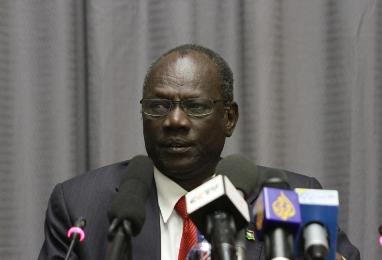Government warning undermines S. Sudan’s media freedom: CPJ
March 15, 2014 (JUBA) – An independent media body has criticised South Sudan’s growing intolerance towards a free press, saying such oppressive tactics explains why South Sudanese fought decades of civil war with neighbouring Sudan in quest for independence.

According to the minister, broadcast interviews with rebels by local media are considered “hostile propaganda” and “in conflict with the law.”
Several reporters, in series of interview conducted with CPJ, acknowledged that attaining a balanced perspective on the South Sudan’s political crisis has been challenging for reporters since it began three months ago.
For instance, while reporters had access to rebel-controlled areas, acquiring an interview with rebels suspicious of outsiders in restive areas was not easy, a reporter told the media body.
“Attaining access [to the rebels] is bad enough,” said one photojournalist who asked not to be identified, adding, “Now trying to air their story may lead to even more challenges.”
Tom Rhodes, the CPJ East African representative, however, said press conditions may still be more tolerant in South Sudan compared to its restive neighbor, where newspapers are routinely censored or confiscated and reporters and editors harassed.
“But South Sudanese authorities’ growing intolerance toward a free press increasingly resembles the oppressive tactics of Khartoum–repression that led the South Sudanese to fight for their independence in the first place,” he wrote on CPJ’s website.
Founded in 1981, CPJ is an independent, nonprofit organization that promotes press freedom worldwide.
ABSOLUTE VIOLATION
The chairman of the Union of Journalists in South Sudan (UJOSS), in an interview with Voice of America (VOA), condemned the remarks, saying the public needs information from both parties in the conflict.
“We need information from all sides–this helps reach decisions that can lead to peaceful negotiations,” said Oliver Modi.
Edmund Yakani, a South Sudanese activist described as “unlawful” minister Makuei’s statement on media operation, and that it tantamount to absolute violation of freedom of expression and right to information stipulated in the country’s Transitional constitution.
“Article 24 (1) [of the Transitional Constitution] says every citizen shall have the right to the freedom of expression, reception and dissemination of information, publication, and access to the press without prejudice to public order, safety or morals as prescribed by law,” Yakani said.
He added, “Article 32 says every citizen has the right of access to official information and records, including electronic records in the possession of any level of government or any organ or agency thereof, except where the release of such information is likely to prejudice public security or the right to privacy of any other person.”
The activist also questioned the context in which the information made his statement, saying any criminal offence in the various laws of South Sudan is identified by two elements, citing guilty mind and guilty act.
“[By] interviewing rebels, where is the guilty mind and the guilty act”? he asked.
“Which law in South Sudan condemns interviews with a person or entity that rebel against the government? So what the minister said is illegal or has no legal base in the court of law,” Yakani stressed.
He however said the minister would have been on course had he warned media practitioners against releasing information to rebels, which has said constituted an offense or source of insecurity to the country.
(ST)
